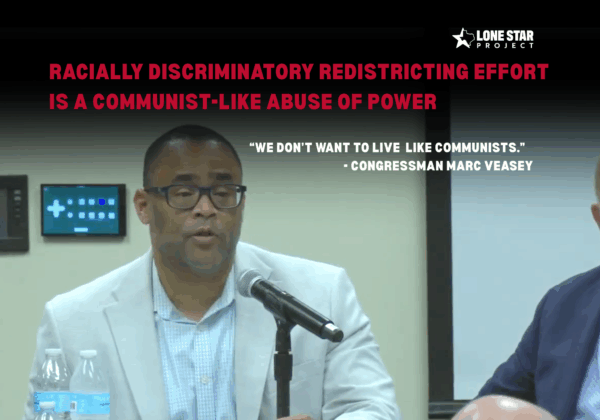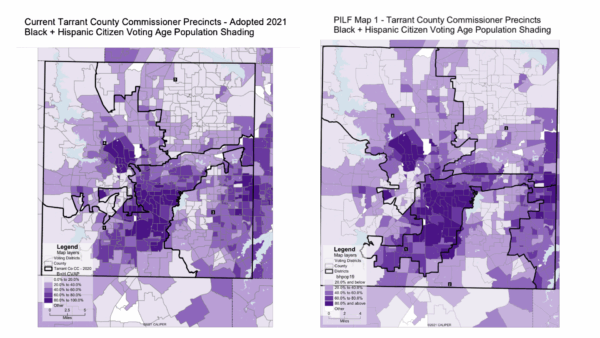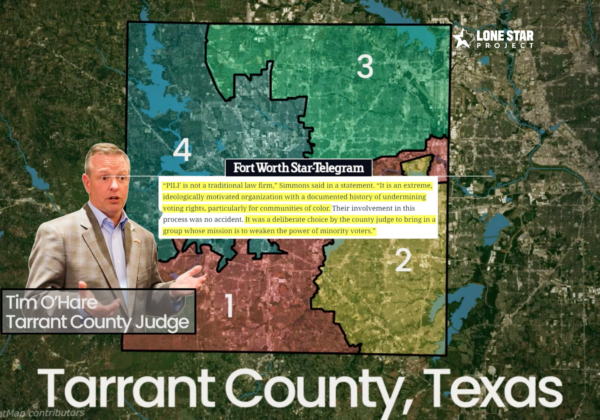Both the Austin American-Statesman and Dallas Morning News have editorialized against Abbott’s investigation saying it, “wasn’t worth the time or the money” and “came up short, despite months of investigating.”
This was in a response to the recent investigative report, by Dallas Morning News reporter, Wayne Slater, that reinforced the Lone Star Project’s claims:
“Mr. Abbott has prosecuted 26 cases – all against Democrats, and almost all involving blacks or Hispanics…Mr. Abbott has not unraveled any large-scale schemes with the potential to swing elections…The cases his office pursued largely have involved mail-in ballots. In 18 of the 26 cases, the voters were eligible, votes were properly cast and no vote was changed – but the people who collected the ballots for mailing were prosecuted. (Dallas Morning News, May 18, 2008)
Tomorrow, Abbott must defend the flawed Texas statute he’s used to justify his vote suppression efforts before a Federal Judge. With financial support from the Lone Star Project and hours of pro-bono legal assistance from a small team of skilled attorneys led by J. Gerald Hebert, five brave Texans, joined by the Texas Democratic Party, filed suit against Abbott and challenged the legitimacy of the flawed election law. Their case goes to trial in Marshall, Texas, before Federal District Judge T. John Ward on May 28, 2008. Dramatic testimony is expected from witnesses who have battled Abbott’s intimidation and suppression tactics.
Key facts on the trial are provided below. To catch up on all the details regarding Abbott’s voter suppression efforts, check out past Lone Star Project reports in the blue shade box below.
Willie Ray v State of Texas
Case # 2:06-CV-385
Case History
Plaintiffs originally filed their complaint prior to the 2006 General Election on September 21, 2006, in the US District Court in Marshall, Texas. The court held a hearing and issued a preliminary injunction against a very specific instance of the Texas election law on October 31, 2006. The Court ruled that Section 86.006 of the election code:
“prevents [Plaintiffs] and dissuades others, under the pain of prosecution, from participating in legitimate organizational efforts designed to maximize early voter turnout.”(Willie Ray v. Texas; Findings Of Fact And Conclusions Of Law, October 31, 2006)
The narrowly tailored Court’s injunction barred the prosecution of a person who possessed the mail-in ballot or carrier envelope of another person, with that person’s consent, but did not actually mail the ballot for the voter. For example, a person who visits his elderly neighbor and picks up the mail which contains a mail ballot on the way into the home and sets the mail on the dinning table would no longer be subject prosecution by Greg Abbott.
Republican Attorney General Greg Abbott, on behalf of the State, successfully appealed the injunction to the Fifth Circuit Court of Appeals. The Circuit Court ruling was appealed to the Supreme Court and denied.
Oral Argument on the substance of the case was held in the Fifth Circuit Court of Appeals in December 2007. At that hearing, Abbott agreed to slight and inadequate changes to mail ballot forms and instructions. The Fifth Circuit then remanded (returned) the case for trial to the US District Court to determine whether Abbott’s changes are adequate to resolve the concerns of plaintiffs and to hear other claims in the case. The trial begins on Wednesday, May 28, 2008.
Court and Presiding Judge
The case is now in the US District Court, Eastern District of Texas, Marshall Division, on remand from the United States Fifth Circuit Court of Appeals. The Presiding Judge is the Honorable T. John Ward, who was appointed to the federal bench by President Clinton in 1999.
Who are the Plaintiffs?
The Texas voters challenging the statute are individuals who have assisted senior citizens complete the mail ballot process or are senior citizens who rely upon assistance to participate in elections. Several have been the targets of Abbott’s aggressive enforcement efforts.
Willie Ray (African American, age 71) and Jamillah Johnson (African American, age 32): Ms. Ray and Ms. Johnson live in Texarkana, Texas. Ms. Ray is a respected member of the Texarkana City Council and Ms. Johnson is a local activist. Both are Democrats, and both have been prosecuted by Attorney General Abbott for assisting senior citizens participate in elections.
Gloria Meeks (African American, age 71): Ms. Meeks lives in Fort Worth, Texas, and is a community and political activist who has assisted senior citizens in elections. Meeks was harassed by Attorney General Greg Abbott investigators who admitted to peeking into her bathroom window. (read the report here) Tragically, since this harassment, Ms. Meeks has suffered a stroke and is now disabled.
Reuben Robinson (African American, age 61) is a disabled veteran and is a homebound voter. Robinson depends upon the assistance of others to apply for and cast his mail-in ballot.
Eddie Jackson: A senior citizen and Democratic political activist from Karnack, Texas, Jackson assists dozens of elderly and disabled homebound voters apply for their mail-in ballots.
Texas Democratic Party: Texas Democrats encourage community and party activists to help maximize voter turnout by providing voting assistance, particularly to the elderly and disabled. They have associational rights that are protected under the United States Constitution.
Who are the Defendants?
The complaint challenges both the Texas statutes and the method by which public officials enforce them.
The State of Texas: A number of the statutes challenged were enacted by the Texas State Legislature and signed by Republican Governor Rick Perry in 2003.
Republican Texas Attorney General Greg Abbott: Greg Abbott has used federal grant funds and the official resources of his office to prosecute elderly and minority citizens who, in most instances, have done nothing more than help their neighbors vote. “Mr. Abbott has prosecuted 26 cases – all against Democrats, and almost all involving blacks or Hispanics…Mr. Abbott has not unraveled any large-scale schemes with the potential t o swing elections.” (Dallas Morning News, May 18, 2008)
Republican Texas Secretary of State Phil Wilson: As Secretary of State, Wilson is responsible for ensuring that election laws in Texas receive uniform application and interpretation. Wilson is also responsible for processing and resolving complaints about elections. Wilson replaced Republican Roger Williams who was Secretary of State when the case was originally filed.
What Statute is being Challenged?
The statutes challenged are Sections 64.036(a)(4), 84.003(b), 84.004, 86.0051, and 86.006 of the Texas Election Code.
Summary of Claims
Plaintiffs assert that the recently enacted statutes that make it a crime to possess even a sealed ballot of another voter violate both the U.S. Constitution and the Voting Rights Act by denying senior citizens and community activists the ability to receive and provide legally protected assistance to participate in elections and, in the case of challenged ballots, the very right to have their vote counted.
2003 Statutes are not needed to stop actual voter fraud: Texas laws on the books prior to 2003 make it illegal to defraud voters or seek to “rig” an election.
“Texas law has long provided for criminal and other penalties to combat voter fraud.” (Willie Ray v. State of Texas, page 8)
“The 2003 legislation has the purpose and effect of suppressing legitimate and constitutionally protected voting activity, particularly in minority communities, as well as suppressing the legitimate, non-fraudulent expression, organization and activism of political parties and their members.” (Willie Ray v. State of Texas, page 8)
The Challenged Statutes Violate both the U.S. Constitution and the Voting Rights Act: The rights of an individual to participate in elections, have their vote counted, associate with others for political purposes and obtain assistance in voting from the person of their choice are protected by federal law. The challenged provisions deny individuals these rights.
“Most plainly, the challenged provisions violate the right of voters … to obtain and cast a mail-in ballot. Pursuant to Section 86.006(h), a ballot returned in violation of any of the restrictions of Section 86.006 “may not be counted”, thereby expressly disenfranchising voters who have received assistance allegedly in violation Section 86.006.” (Willie Ray v. State of Texas, pages 18)
“The natural and actual consequences of the vagueness of the challenged provisions is to chill individuals’ exercise of their protected federal rights, including but not limited to their right to vote and their freedom of association.” (Willie Ray v. State of Texas, pages 22)
Abbott’s Enforcement is targeted at minority voters in violation of the Voting Rights Act: Texas Attorney General Greg Abbott is blatantly exploiting a flaw in Texas statutes to justify a phony voter fraud task force that selectively targets elderly, minority Texans who traditionally vote Democratic. Abbott’s office has engaged in harassing actions, including spying through the bathroom window of a Fort Worth senior citizen, while ignoring complaints of vote fraud by Republicans.
“….a vastly disproportionate number and percentage of those targeted for investigation and prosecution by defendants under Section 86.006 have been minority persons, namely African American or Latinos.” (Willie Ray v. State of Texas, page 24)
“….officials in the Attorney General’s office have prepared and disseminated training materials on voter fraud in Texas that make the invalid claim that a relationship exists between membership in a minority group and engaging in voter fraud activity.” (Willie Ray v. State of Texas, Page 25)



